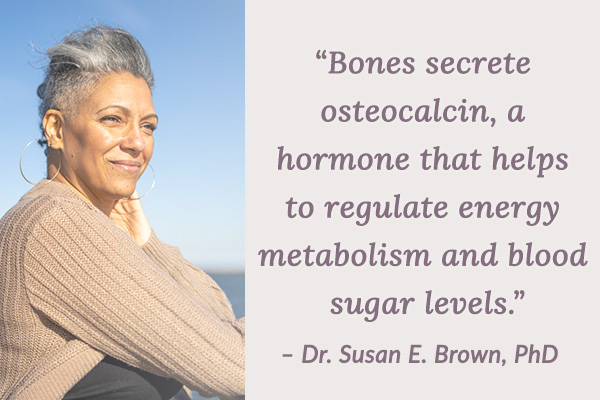Here’s what you need to know about this surprisingly symbiotic relationship
Authored by Dr. Susan E. Brown, PhD
When your body talks to your bones, it does so through chemical messengers you’re likely familiar with: hormones like estrogen, progesterone, testosterone, growth factors, thyroid and parathyroid hormones, and Vitamin D, among others. This larger endocrine system regulates the development, maintenance and renewal of bone. Your amazing skeleton listens to these silent chemical messages very carefully — but it not only receives messages, it also sends them out to every other tissue in the body, creating a complex network of information flowing out of the bones.

Here’s a simplified overview of how our bones “talk” through the hormones they produce:
Osteocalcin: This osteoblast-derived hormone helps regulate whole-body energy metabolism and blood sugar control by stimulating the production of insulin. It also stimulates the brain to impact memory and mood. In men, osteocalcin encourages the testicles to produce testosterone.
Lipocalcin 2: A hormone dispatched by bone to help fight bacterial infections, manage fat as an important fuel source and talk to the brain about appetite control.
Sclerostin: A bone-derived hormone known to control bone growth. Sclerostin is also dispatched by bone to manage fat as an important fuel source. In mice this hormone helps convert “bad” white fat to energy-burning beige or brown fat.
Leptin and adiponectin: These two hormones are produced in the marrow of bones and white adipose (fat) tissue. Leptin is a key regulator of energy homeostasis and acts as an indicator of the body’s long-term energy reserves. This hormone signals the hypothalamus to regulate satiety, energy balance, fertility and immune function. Without leptin, you have insatiable hunger and obesity develops.
Adiponectin: This is a protein produced by bone marrow fat cells (adipocytes). Decreased circulating adiponectin is an established biomarker for increased risk of cardiometabolic diseases.
Fibroblast growth factor 23 (FGF 23): Bones use this messenger to tell the kidneys to rid the body of extra phosphates that build up in certain genetic disorders.
Why “bone talk” is important to you
Our skeleton is a very complex and intelligent organ directing system-wide essential functions. Much of this bone-derived chat is aimed at regulating whole-body energy metabolism, glucose control and appetite control — areas where bones benefit from being in the driver’s seat because our skeleton needs a great deal of energy to maintain and renew itself on a constant basis. Caring for our bones, we literally help care for the entire body.
Modern science is only beginning to understand the vast field of information and intelligence we identify as our body, and it’s on the brink of linking bone health to the development of diseases like diabetes and obesity. Bringing your awareness to the “wonders of you” enlivens that intelligence and enhances your well-being.











